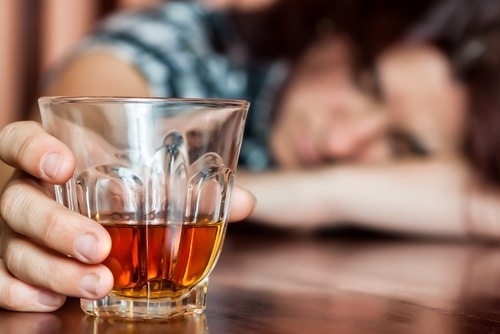By Heidi Kinsella, MA, LMHCA, NCC, ASAT
Family Counselor, Gentle Path at The Meadows
After news of the sudden death of actor and comedian Robin Williams, I was amazed by the impact this incident was having on people. I read post after post from my friends on Facebook about their sadness from the loss of such an incredible talent and the shock that his life came to a tragic end from suicide. The media has been full of reports about Mr. Williams’ battles with alcoholism and depression over the years. How could this happen? How do we make sense of this talented, funny man being so depressed that his only choice was to end his life? This unfortunate event moved me to reflect on my personal story in hope that it might resonate with at least one reader and encourage that individual to seek help.
According to Oltmanns and Emery (2007), alcoholism and depression are related phenomena and approximately 40 percent of people who suffer from alcoholism have experienced major depression at some point during their lives. The authors additionally state that anxiety and alcoholism are likewise associated and “people who have an anxiety disorder are about three times more likely to have an alcohol use disorder than are people without an anxiety disorder” (Oltmanns & Emery, 2007, p. 188).
I can see these statistics ringing true within my family dynamic. Depression and anxiety run alongside the alcoholism for my siblings and parents. For those family members who choose to drink alcohol, their depression and anxiety becomes glossed over and ignored because the fallout from their drinking overshadows other mental health issues. However, the presence of depression and anxiety became very known to me after I made the decision to quit drinking. Once I was no longer numbing the pain with alcohol, I was left to deal with the depression and anxiety.
During the past twenty-five years in sobriety, I have had times in my life when I have been functional, where depression and anxiety have not interfered with my being. However, that hasn’t always been the case. I have struggled with either depression or anxiety during times of major life stressors. For example, when going through a divorce at the age of 23, I experienced severe depression to the point that I could not eat or sleep. I also experienced other somatic symptoms such as aches and pains in my body, headaches, and eye aches. Concentrating was very difficult, which made it impossible for me work. At that point, it was necessary for me to take a couple of months off from my job to, as I put it, “clear my head.”
After the depression had subsided, my grandmother shared that during my depressed period it was difficult to have a conversation with me. She told me that if I was asked a question, either I wouldn’t answer it at all or I would answer something else. Obviously, my head was not clear!
I turned my attention inward, practicing a ruminative style of dealing with this life stressor (Oltmanns & Emery, 2007) by asking myself questions over and over, such as “Why did he leave?;” What did I do wrong?;” and “How could he have done this?” I had no job, no husband, and was humiliated by his affair. I felt hopeless—a classic symptom of depression.
I again found myself in a similar experience twelve years later with my second husband after learning about his sex addiction. I experienced many of the same somatic and psychological symptoms of depression; however, this time anxiety also created havoc in my life. I was unable to sleep, consumed with worry about every aspect of my life and contemplated over thoughts of him with other women. The more I tried to repress my thoughts, the worse they would become. It felt as if my mind was racing all of the time, and I couldn’t focus on what I needed to do. I knew these thoughts were not rational, and it made me feel stressed and crazy.
The situation once again affected my job performance. Somehow, this time I managed to go to work every day, but nearly lost my job when the irritability reached a high threshold and I exploded at my boss. Luckily for me, I had a long work relationship with her, and she knew “I wasn’t myself.” This was the wake-up call that got me into therapy.
When I started therapy, I was diagnosed with clinical depression and anxiety. I was started on an SSRI and received interpersonal therapy that focused on current relationships. I came to realize that since I had stopped drinking at the age of 23, I had been vulnerable to anxiety and depression every time a major life stressor occurred.
So, why did I have these vulnerabilities? Oltmanns and Emery (2007) refer to a twin study that has shown “environmental factors influence the expression of a genetically determined vulnerability to depression” (2007, p. 151). In my case, depression and anxiety, as well as alcoholism, are generational. It is very likely that I have a genetic vulnerability to these mood disorders. When life stressors occur, I experience depression and anxiety because of this genetic vulnerability. Without the life stressors, perhaps I wouldn’t have experienced the anxiety and depression.
Like many people in recovery, getting sober did not resolve my life’s difficulties. It stopped the drinking, but not the pain and suffering that depression and anxiety create. I believe that many people in AA who suffer from depression and anxiety continue to do so because it goes untreated. Unfortunately, there are many people in AA who believe it’s inappropriate to go to therapy or take medication. This idea is not supported in AA literature, but has taken hold in some parts of AA, which inhibits many people who need help with depression and anxiety from getting the help they need.
What does Alcoholics Anonymous say about getting outside help from a counselor or therapist?
The answer to this question can be found in the AA pamphlet called, “Questions and Answers on Sponsorship.” This pamphlet can be found here.
Below is a quote taken from page 14 of this conference approved pamphlet:
An A.A. sponsor does not offer professional services such as those provided by counselors, the legal, medical or social work communities, but may sometimes help the newcomer to access professional help if assistance outside the scope of A.A. is needed.
What does AA say about taking anti-depressants or other medications for mental health issues?
AA addresses this issue in their pamphlet called, “”The A.A. Member: Medications and Other Drugs” which can be read online here.
This quote was taken from page 6 of this conference approved pamphlet:
A.A. members and many of their physicians have described situations in which depressed patients have been told by A.A.s to throw away the pills, only to have depression return with all its difficulties, sometimes resulting in suicide. We have heard, too, from members with other conditions, including schizophrenia, bipolar disorder, epilepsy, and others requiring medication that well-meaning A.A. friends discourage them from taking any prescribed medication. Unfortunately, by following a layperson’s advice, the sufferers find that their conditions can return with all their previous intensity. On top of that, they feel guilty because they are convinced ‘A.A. is against pills.’ It becomes clear that just as it is wrong to enable or support any alcoholic to become re-addicted to any drug, it’s equally wrong to deprive any alcoholic of medication, which can alleviate or control other disabling physical and/or emotional problems.
In 12-step meetings, I do talk about my battles with depression and anxiety because I feel it’s important to let other alcoholics know that they too can receive help and live happier, more productive lives. Just because alcoholism, depression, and anxiety are often co-morbid, does not mean that a person has to live a life of sobriety battling depression and anxiety. I know from firsthand experience that with the proper treatment, a productive, happy life is possible.
We Can Help
If you suffer from depression or anxiety, there is help, regardless of whether you are already sober from addictions. Sometimes when people are sober from addictions, they think they “should” be able to handle life’s ups and downs. There is no shame in asking for help. For more information, please call 800-244-4949 or contact us here.



